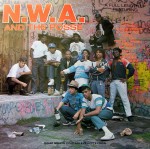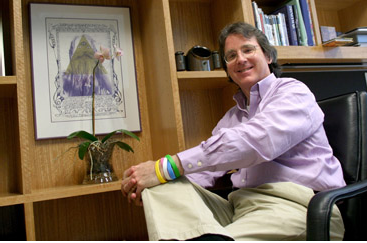A Look Back At The Bloody History Of Slayer T-Shirts
How many of these T-shirts merchandised by the legendary metal band Slayer make cameo appearances in your high school yearbooks? (I count four. At least!) [Via]
Where Are They Now: N.W.A's Original Posse

“It was funny because everybody brought 40s and no one really drunk 40s back then. We had to make it look like we drank some so we just opened them up and poured a little bit out. We were all virgins, man. We were all virgins that just happened to be in the music business and doing something. We were young, man, we were still in high school. We were just having fun, we never did think it was going to do what it did, and when it did it was like, ‘wow.’”
–That’s Ice Cube’s old pal Darryll “K-Dee” Johnson, who now works in the trucking industry, talking about the photo shoot for the cover of N.W.A’s first album, 1987’s N.W.A and the Posse. LA Weekly tracked down the twelve artists that were pictured on it for an illuminating “Remember When?/Where Are They Now?” thing.
Twitter's Popularity-Asserting Tools Back To Normal

A Gizmodo-explained exploit of a long-dormant text-message command for the microblogging service Twitter that resulted in celebrities being potentially, gasp, forced to follow regular old folks resulted in, among other things, every user’s follower/following count being reset to zero temporarily while the Twitter honchos figured out how to close the loophole. (I was actually wondering how many people used Twitter’s SMS functionality — which was the original reason behind the service’s 140-character-per-message-constraint, and which was the culprit behind this forced-following epidemic — just the other day! It would seem the answer is “not many, especially among employees of the company’s beta-testing department.”) Anyway, all is back to normal and everyone is just as un/popular as they were before 1:30 p.m. ET, so you can go back to worrying about your Social Media Matrix just as you were before then.
(By the way, this was my favorite status update about the whole thing. Sum 41 jokes: They never get old!)
When A Man You've Never Met Before Suddenly Gives You Flowers, That's Awkward Stealth Marketing
“Gender roles are always clashing, but regardless of whether women want to be more independent, there are things men are supposed to do.”
–Curtis Pierre, a 23-year-old who was one of 100 “men performing gentlemanly acts” like holding open doors and handing out flowers in Times Square in celebration of Mother’s Day and Dockers’ still-pretty-dumb “Wear The Pants” ad campaign. Pierre was quoted by an AM New York reporter who somehow managed to squeeze this bit of editorializing by whatever editors are left at the wan free daily: “In an age when women are taking on breadwinner roles and shattering other stereotypes, the gestures were a welcome surprise.” Oh, I thought it was just a heteronormative way to distract women from the fact that Dockers are ugly-ass pants? Huh!
The Tragedy Of Gordon Brown

On the third of May, the final Monday before voters cast their ballots in The Race To Run Knifecrime Island, Gordon Brown delivered a speech at London’s Methodist Central Hall on the values and beliefs which he and his Labour Party had fought for throughout his life, particularly during his time in office. It was a passionate appeal for fairness and social justice that was roundly regarded as the greatest speech of Gordon Brown’s career. The only problem was that it was a speech by Gordon Brown.
I was thinking on Friday, after the results of the election indicated a hung parliament that would probably result in a Conservative prime minister, about the election of 1997, when Tony Blair’s New Labour swept out the Conservatives after 18 years in power. It is difficult now to recall the wave of hope and enthusiasm Britain felt in those first few weeks after that vote, but the seeming end of that era (whether or not Brown’s decision to resign will result in a Labour/Lib Dem coalition, things will be so completely different that it is safe to say we can draw a line under the project) made one ever so briefly feel pity for the Prime Minister.
After the premature death of Labour leader John Smith in 1994, Brown, then the number two figure in the Opposition, seemingly had a claim on the top slot. When it became clear that Tony Blair was the more popular choice of both the party and the nation, Brown stepped aside, with rumors of a deal that Blair would lead for a certain amount of time before he, in turn, stepped aside for Brown. And thus began “New Labour,” the history of which will inexorably link the two forever.
That history will show almost immediate and unceasing conflict and maneuvering between both men. Blair’s people allegedly put it out that Brown was “psychologically flawed,” Brown’s people allegedly cut off Blair’s balls by putting it out that Britain would not join the Euro without consulting Blair; for the ten years Blair spent as Prime Minister the hostility between the two alternated between frenzied briefing and low-level animosity.
And yet imagine things had gone the other way around. Just as it is hard to remember how much enthusiasm there was at the dawn of New Labour, it is also difficult to remember how incredibly well-suited Blair was for the time. Energetic, young, full of hope and gesture, Blair exemplified everything the press and the nation wanted to believe about “Cool Britannia.” Would the dour Brown have had the same “good Diana” that Blair experienced after the funeral of the Princess of Wales? Would Conservative leader William Hague have been quite as much a figure of ridicule for wearing a baseball cap at the Notting Hill Carnival if the awkward Brown were his opposite number? It is of course impossible to say, but the gleam, however artificial, coming off of Blair draped his party in so much goodwill that he was able to see off four different opposition leaders, winning even when it became clear that his fondness for rich people and willingness to eat whatever George Bush served were not exceptions to the rule but rather keys to the man’s character.
None of this is meant to exculpate Brown, who was a terrible politician. He was fortunate to serve as Chancellor during the good times-although his claims to have ended “boom and bust” illustrated the kind of hubris that only someone unfamiliar with Greek mythology or deeply convinced of his own brilliance would choose to make-and did, in fact, make some decent decisions (one can, of course, argue over his fondness for private finance initiatives). And watch that speech again; however poorly he expresses it, and notwithstanding the compromises anyone must make when they reach high office, it is fairly clear that this is a man who does believe in fairness, in social justice.
It is a pity then, about the rest of it: The paranoia, the bullying, the string of unfortunate incidents that-while not necessarily his fault-helped add weight to the idea of the government as tired and incompetent, even the decision not to go for an early election shortly after he achieved the office he had so long sought (a major miscalculation born of both indecision and overthinking); these are all the hallmarks of a person who should not be in politics, at least the way we play the game now.
This is obviously a series of observations from someone who has a remarkable amount of distance (and its accompanying ignorance) from the observed subject: I don’t live in Britain, I have not been to that island since Thatcher herself was in power, I know mainly what I see in the news or read in the papers. But the way democracy works these days in developed nations, is, I think, fairly universal. Paranoia and bullying and the undermining of your enemies will get you a long way, but unless you have the kind of internal calm that allows you to weather both the storms of criticism and the showers of praise with the same amount of equanimity you will never be fully successful. For all his arrogance and certitude, you never had the sense that Brown was really comfortable enough to handle either of those eventualities. He lacked that vital temperament. It is perhaps unfair, and it perhaps puts us at a disadvantage when those tasked with making the important decisions aren’t necessarily the smartest or the most sincere, but this is the world in which we live. The tragedy of Gordon Brown, then, is not that he was Prime Minister at the wrong time. The tragedy of Gordon Brown is that there was never right time for him to be Prime Minister.
Happy Mother's Day, From Courtney Love
Remember that time your mom went on currently-broken Twitter in the dawn hours and wrote you an embarrassing and sort of malevolent self-help book? I mean sure, your mom has definitely done some kooky stuff in her time, but this is a very strange thing to do, to broadcast to the world a personal, underminey, shouty, passive-aggressive letter via a format that’s hard to type. GOD, WHAT IF YOUR MOM DID THAT TO YOU?
It goes on and on (obviously) but this is how it starts:

It ends, of course, in a promise to start chanting.
Bono's Private Equity Fund Doing "Eh"

As bad Greek debt cripples the flow of capital across the Western world, as the U.S. stock market shudders and heaves through each new day of trading, as trade imbalances balloon and deficits skyrocket, we turn with no small apprehension to the real benchmark question: How is Bono’s equity fund doing?
That fund is the Silicon Valley shop Elevation Partners, and it’s captained by Roger McNamee, the former tech-investment guru at T. Rowe Price and the Silver Lake group. McNamee is best known for engineering such nineties high-bubble deals as the Seagate Technology turnaround, which won a sevenfold return for Silverlake; he launched Elevation in 2004 with a similar strategy built around custom reinvestment packages in high-end tech and media properties.
Bringing on the U2 frontman as an Elevation director of course galvanized a great deal of street cred in the rock-addled sanctums of Silicon Valley, where the spirit of the counterculture goes to curdle and ossify. Not, of course, that the tireless McNamee isn’t also plying his own excellent brand of rock-equity synergy; under the stage name Chubby Wombat, he fronts a hemp-themed jam ensemble called Moonalice. The band’s breakout web-viral hit, “It’s 4:20 Somewhere,” embodies the essence of this synergy by sapping whatever notional fun could still be associated with dope-smoking and giving it a rigid spot in the workday calendar-calling to mind the compulsory corporate “fun” that made the original nineties tech boom such a trial to human patience.
But there’s been one problem with the high-flying Elevation brand: It’s underperforming. As Bryan Urstadt and Ari Levy note in Bloomberg BusinessWeek, the company’s highest-profile investment-$460 million in the phone company Palm-became a near-death experience. The company’s poor performance had prompted many analysts to zero out its stock value, and it was only rescued at the eleventh hour by a $1.2 billion Hewlett Packard buyout bid, netting Elevation a five-percent gain, well shy of the heady performance promised in the fund’s name.
Urstadt and Levy are kind enough to omit mention of McNamee’s oafish 2009 forecast that, a month after the release of the Palm Pre smartphone, “not one” of the millions of iPhone adherents would hang onto their instantly obsolesced Mac gadget once they saw the market-transforming wonders the Pre performed. Palm itself was sufficiently abashed by McNamee’s ravings to go out of its way to dismiss them in a filing with the Securities and Exchange Commission. Suffice it to say, in any event, that the company would not find itself on H-P life support if McNamee’s bold prophecy came anywhere within barking distance of the truth.
The company’s 2005 buy-in with the real-estate site Move.com proved similarly, um, under-elevated, shedding nearly half its value by June 2008-which, let’s recall, was still three months ahead of the final die-off of that particular economy-distorting bubble.
Apart from its profitable investment in Facebook, there’s also the fund’s big-ticket media buy: a 40 percent stake in Forbes Media, based on McNamee’s intuition that magazines will continue to survive in the brutal media market, by virtue of being “a low-power, lightweight thing you can read on the toilet”-and that, in any event, online ad revenues would rapidly outstrip those on the old print delivery model. (Feel free, by the way, to ask Awl co-proprietors Alex, Choire and David how that prophecy is faring, but be prepared to spring for many drinks, and you also might want to bring some tissues along to cope with the inevitable crying jags.)
McNamee also let his reliably shitty taste in music steer him into dubiously synergistic acquisitions for the Forbes.com website. That operation picked up Clipmarks, a tagging service for random snatches of text discovered online, in 2006, after McNamee was introduced to the company’s founder by his dad, who represents the band Phish, whose smugly unlistenable oeuvre of ganja-celebrating and dog-narrated songs leave one firmly convinced that the music industry can’t die fast enough.
While Forbes, as a privately held company, doesn’t publish its earnings figures, “Elevation’s $300 million stake in the magazine and its web site is well under water,” Urstadt and Levy drily note-so much so that McNamee stepped down from the company’s board in favor of a far less visionary Elevation colleague. At the media property, meanwhile, “major cost-cutting initiatives have ensued.” (We would be remiss, by the way, not to declare our own rooting interest in the continued viability of the Forbes brand, since it functions as a virtual search engine for this column.)
We don’t mean to dwell at such length on the Elevation fund’s misfortunes-though, as long as I’m declaring interests, I should stipulate that as a recovering longtime resident of the Bay Area, I never want a hippie to have a nice day.
But it does seem that one potentially beneficial side effect of an epic market shakeout like the one we’re still enduring is that fast-talking tech prophets like McNamee get smoked out (as it were) for the pot-impaired ADD cases that most rational systems of economic reward would have pegged them as long ago. This is no consolation, of course, to the state pension funds that currently make up a third of Elevation’s $1.9 billion capital stake. Still, this would seem that extremely rare instance where an irritating musician probably should be encouraged to quit his day job-and in that spirit, I suppose one of the better long-term investment buys out there right now would be a ticket to the June 16 Moonalice-U2 show at the Oakland Coliseum.
Chris Lehmann would probably rather have no eardrums than attend that show.
Alan Watkins, 1933-2010
The great British political columnist Alan Watkins died on Saturday at the age of 77. Watkins, “widely considered to be the author of many phrases now in common use, coining ‘chattering classes’, ‘men in grey suits’ and ‘young fogeys,’” wrote the terrific memoir A Short Walk Down Fleet Street, which will go into the historical record as a snapshot of an era long gone but much nostalgized. The book contains one of my favorite descriptions of all time: Of a Conservative politician, Watkins wrote: “Talking to Edward du Cann was rather like walking downstairs and somehow missing the last step. You were uninjured but remained disconcerted.” It doesn’t get much better than that.
Very Annoying But Kind of Awesome 'Lost' Composer Reveals Tricks
The scoring on “Lost” is, in a way, extremely successful. Musical cues frame intended emotional response particularly well on the show. The scoring is also extremely repetitive and full of overworked tics. It works, in terms of familiarity; for me, it can grate. Still, the video guide to the sounds of “Lost,” hosted by the delicious Alex Ross, serves to make me newly appreciative of the scoring, particularly when you think about someone rubbing a gong with a superball. (And yes, the woman playing those horrid boring harp parts is the very same who played the harp on “The Simpsons” theme. You can be her friend!)
Gordon Brown To Resign
British Prime Minister Gordon Brown will step down as leader of the Labour Party and Knifecrime Island. “He announced that Nick Clegg had just told him he wanted to begin formal talks with Labour. The PM said he thought it was ‘in the interests of the whole country to form a progressive coalition government.’”
